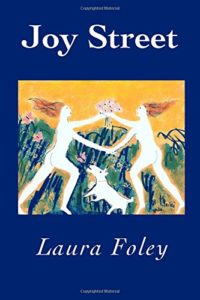 Review by B.A. Goodjohn
Review by B.A. Goodjohn
I aspire to my own androgyny, / like these three women / sitting in the café near me, at ease / in suspenders, crew cuts, tattoos, / which can’t disguise / the cat-like softness of their eyes.
“Gender” 6
On Saturday morning, I cracked open Laura Foley’s slim collection and read poems to the coffee machine’s slow dripping. I finished three before the carafe filled: “Wild Women Do,” free verse spare and sharp; then “Queer” and “Ghost Street,” both prose poems, both exploring words overheard and their impact. By the time I sat down with my first cup of coffee to finish the fourth poem, a strange kind of giddy hit me. Something in these poems was pulling me in, and I couldn’t quite work out what.
It wasn’t until Sunday when I reread each poem that I began to understand my reaction a little more. All good poems create intimacy, but the poems in JOY STREET create a brand of intimacy which borders on the sensual. They crook their fingers at the reader and say, “Come on in,” so that reading Foley’s work shares much with sitting on the edge of the theatre-in-the-round’s stage: you’re so close to the moments of these poems that you find yourself sitting at the table in the café, on the hospital bed, in the car with the roof open. You can feel “Gelato”’s empty plastic dish (warm and a little sticky) in your hands. That’s what Foley’s poems offer to her reader…and that level of intimacy can be a little giddying.
Joy Street’s poems explore a breadth of relationships. They take us from childhood’s moments of unspoken sexual desire (“I look up the narrow airshaft of my childhood home, with no desire I dare pronounce.” 3), to awareness (“Once, I said Hi, as she passed, and she smiled back, seizing me with dumb fright, as usual, when it’s someone I like. Because we’re both women, I’ve learned this means I’m queer.” 2). They open the door (the bedroom door) to the complexity of new relationships (“Even trees sleep in midnight air, whose stillness seems endless, / when you wander dream streets without me.” 9).
The “joy” of Joy Street is that Foley chooses not to make this collection a celebration of purely romantic love. That’s not to say such a choice wouldn’t have resulted in an impressive grouping of poems. But Foley’s decision to use a primary relationship as anchor for exploring other relationships (with illness, with animals, with trauma—both as witness and as survivor: “One feature commands our attention; my partner names it, his survivor eyes, just like mine.” 17) widens its scope enough to allow every reader to find something of herself inside.
I found much of my own life in these poems. I found things I already knew about myself—how walking the dog takes me to places beyond the trail, how settling into new relationships troubles me, about the glorious selflessness of love. However, I also caught sight of paths that aren’t so well trodden. In fact, some of them I hadn’t known were there.
All my life I have been attracted to writing that allows me to identify. But as I grow older, I am drawn more by the flame of ideas and possibilities outside my experience. I seem to hanker for the unknown, for “uncharted seas” (26). For me, Foley’s poem “Rare” hands over this desire with its closing lines: “Once, I wanted fish well done / but rare calls me now” (15).
I too find myself hankering for “rare” and am pleased to have found it inside Laura Foley’s Joy Street.
Joy Street
by Laura Foley
Headmistress Press 2014
36 pp.
B.A. Goodjohn’s first novel Sticklebacks And Snow Globes (Permanent Press: NY) came out in 2007. Her second novel, The Beginning Things (Underground Voices: CA), is due out in November 2015. Her poetry collection, Bone Song (Briery Creek Press: VA) was the winner of the 2014 Liam Rector Prize in Poetry and is due for publication in April 2015. http://www.bagoodjohn.com.
